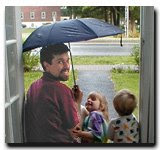Get into the habit of packing a lunch in reusable lunchware. You'll save money, eat healthier, and help clean up our landscape.
More Facts About Packed Lunches
- A recent article in Forbes magazine listed packing your own lunch as the number one way to save money at your job, with an estimated annual savings of $780.
- Packing your own lunch makes it easier for you to eat a healthy mid-day meal because you can control your portion size, include a variety of fresh fruits and vegetables, and avoid processed foods.
- If everyone used reusable lunchware, we could keep billions of disposable cups, utensils and wrappers from littering our landscape and clogging our landfills.
- Eating lunch within walking distance helps reduce traffic congestion at one of the busiest times of day. According to the Bureau of Transportation Statistics, more car trips are taken per hour during lunch time (noon to 1 pm) than during the morning commute hours (7 am - 9 am).
- The United States Department of Agriculture's Food Safety and Inspection Service provides several recommendations for "bag" lunches: pack just the amount of perishable food that can be eaten for lunch so you won't have to worry about the safety of leftovers, include a frozen gel pack or frozen drink to keep food cold, pack your lunch in an insulated lunch box, or pack items that don't require refrigeration, such as whole fruits and vegetables, hard cheese, peanut butter and jelly, breads, and crackers.
- Rigid containers, such as stainless steel tins, keep everything from getting smooshed, making it easy to enjoy a healthy salad and fresh fruit every day.
- Ramit Sethi, the author of I Will Teach You To Be Rich, suggests starting by deciding how many times each week you will pack your lunch, and how many times you will eat out. That way, you can plan ahead so you aren't stressed out every morning trying to put together a lunch for the day.
- Having two or three sets of reusable lunchware makes your life easier because you don't have to worry about washing your lunchware every single day. If you forget or get too busy to wash things one evening, you'll still have a clean set ready to use the next day. (You will eventually have to wash them all, though!)
- If you're really pressed for time in the mornings, pack up your lunch the night before and put it in the fridge. Until you get into the habit of taking your lunch with you, a reminder note on your door ("Don't forget lunch is in the fridge!") might be a good idea.
- Packing your own tap water in a stainless steel bottle is by most accounts the cheapest and healthiest option for drinking. (Buy a water filter if you're concerned about chlorine or other contaminants in your tap water.) You risk cracking a metal bottle if you put it in the freezer, but you can fill it with ice cubes to help keep your food cool. By lunch time, the ice will have melted and your water will be ready to drink.
- Signing up for a community supported agriculture (CSA) share, or visiting a farmers market, is a great way to buy fresh local food in season for a week's worth of lunches.
- One reason people don't bring their own lunches to work is that they don't want to miss out on going out to eat with their colleagues. If you can change the culture of your workplace, people can bring their lunches and eat them together. Lunch time is important for socializing and networking; in a "green" workplace, you can bring your own lunch and eat it, too, without being left out of the group.
- A "naked" lunch rule will help you make sure you really are saving money, eating healthier, and keeping our landscape clean. Ideally, everything you pack in your lunch will be "naked", i.e. it won't be in its own individual wrapper. For example, whole fruits and vegetables, sandwiches, and your water or other beverage will go "naked" into your reusable lunchware. Anything that comes in its own plastic, paper or foil wrapper is likely to be more expensive, less nutritious, and (thanks to the extra wrapper) more wasteful than a naked alternative.
- Don't forget to bring home your peels, pits, paper napkins and any left overs. It all makes great compost!


No comments:
Post a Comment